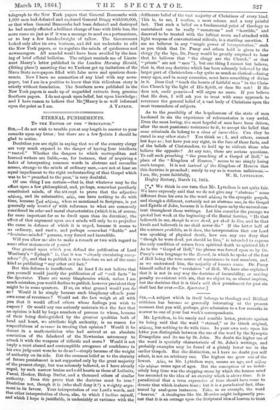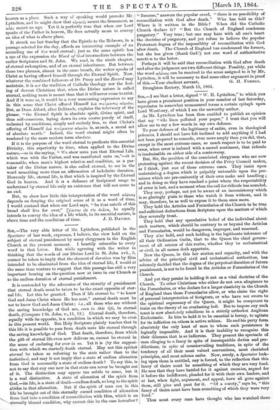SIR, —A subject which in itself belongs to theology and Biblical
criticism has become so generally interesting at the present moment that you will, perhaps, give admission to a few remarks in answer to one of your last week's correspondents.
Mr. Lyttelton, in his manly and sensible letter, protests against its being said that the word "eternal," or its Greek original, aitLyme, has nothing to do with time. In your own note upon his letter you distinguish between the use of the word by the Synoptic Evangelists and its use by St. John. No doubt the higher use of the word is specially characteristic of St. John's writings, and probably examples may be found of a plainly lower use in the earlier Gospels. But the distinction, as 1 have no doubt you will admit, is not an arbitrary one. The highest use grew out of the lowest. Alc4, as Mr. Lyttelton says, means an age, and ai.17.nas ri'vs aleopwv mean ages of ages. But the conception of au indefi- nitely long time was the stepping-stone by which the human mind
has ascended to the idea of an eternity which is above time. It is
paradoxical that a term expressive of time should have come to denote that which is above time ; but it is a paradoxical fact, illus-
trated by analogous instances. Take, as an example, the word "heaven." A theologian like Mr. Maurice might indignantly pro- test that it is an outrage upon the Scriptural idea of heaven to treat
heaven as a place. Such a way of speaking would provoke Mr. Lyttelton, and he might show that oirpook meant the firmament, as alen, meant an age. Yet it is perfectly true that when our Lord speaks of the Father in heaven, He does actually mean to convey an idea of what is above place.
It struck me last Sunday that the Epistle to the Hebrews, in a passage selected for the day, affords an interesting example of an ascending use of the word eternal ; just as the same epistle has a use of the expression the Word of God intermediate between the earlier Scriptures and St. John. We read, in the ninth chapter, of eternal redemption, and of an eternal inheritance. But between these two phrases, almost in the same breath, the writer speaks of Christ as having offered himself through the Eternal Spirit. Now, whatever the combined followers of Dr. Pusey and the Record may maintain, it is not the tradition of Catholic theology nor the feel- ing of devout Christians that, when the Divine nature is called eternal, nothing more is meant than that it will never cease to exist. And if it were so, it would be a very unmeaning expression to say in this sense that Christ offered Himself Br& IrvE6jecotro; alcdviov. But, as Dean Alford, after Delitzsch, explains the relevancy of the phrase, "the Eternal Spirit is absolute spirit, divine spirit, and thus self-conscious, laying down its own course purely of itself, unbound by conditions, simply and entirely free, so that Christ's offering of Himself Bill ulalf,,accros atwiou is, as such, a moral act of absolute worth." Indeed, the word eternal might often be rendered by the more modern term absolute.
If it is the purpose of the word eternal to predicate this essential Divinity, this superiority to time, when applied to the Divine nature,—as in the saying, " We chew unto you that Eternal Life, which was with the Father, and was manifested unto us,"—it is reasonable, when man's highest relation and condition, as a par- taker of the Divine nature, is also called eternal, to see in the word something more than an affirmation of indefinite duration. Heavenly life, eternal life, is that which is inspired by the Eternal God in heaven. And it is a defiance of Scriptural usage to understand by eternal life only an existence that will not come to an end.
But, to show how little this interpretation of the word aidislo; depends on denying the original sense of it as a word of time, I would .contend that when our Lord says, "he that eateth of this bread shall live for ever," Citarat Lie rov atE'eptx, he equally intends to convey the idea of a life which, in its essential nature, is



































 Previous page
Previous page